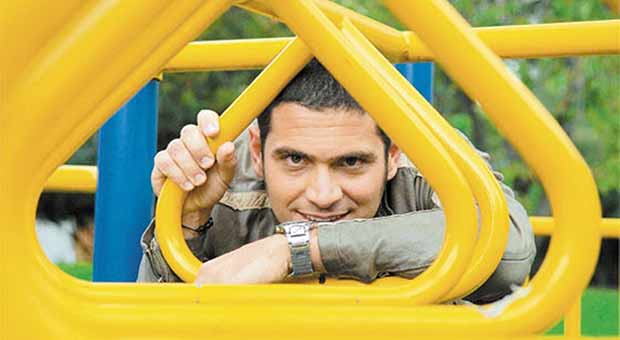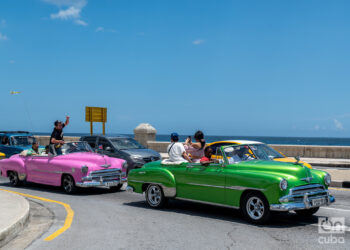The Cuban actor Mijail Mulkay has had an outstanding artistic career and therefore he has received proper recognition in Cuba and in Colombia, a nation where he started to work in 2004.
Mulkay, at present living in Miami where he has succeeded with several theatre plays, was interviewed by OnCuba.
Ten years ago you left from Cuba to start a professional career in Colombia. Can you tell us significant experiences you had during that time?
In October 2004 I travelled to Colombia because the RCN television channel had come to Cuba searching for actors for a production and I was chosen for the project. Over that time there were not many work opportunities in Cuba. The possibility of working abroad was a tempting option, not only from the economic but also from the artistic perspective.
As an actor I had won recognition in Cuba in the cinema, the television and the theatre, in spite of being young, Jajajajaja, I’m not so young anymore. Starting from zero in another country was really difficult but it did prove fruitful.
During nine years I had a lot of work in the Colombian television. With Caracol Television I worked in La ex, Montecristo, Las profesionales del servicio, La quiero a morir, La primera dama and Los caballeros las prefieren brutas. With RCN I worked in Mujeres Asesinas, Amor sincero, El capo 2, A corazón abierto 2 and Casa de reinas, and with Telemundo RTI I worked in Sin senos no hay paraíso, Los victorinos and El clon. Besides I took part in two cinematographic productions El escritor de telenovelas and El control.
Do you think this experience in Colombia contributed with your career as an actor? How?
I gained maturity as actor and as human being. When you start from zero somewhere else you have to follow the rules of the place you are in and that’s exactly what I did. Challenges make you study, overcome goals, be better in what you do, for that I have to thank Colombia. I realized that in addition to having the opportunity to work with them, I had the possibility to live differently.
Colombia will always be a work opportunity for me because that’s how I want to remember it. I’m really grateful for what I received there and I feel that I’m a better actor because of that school.
In January 2013 you settled in Miami. What led you to make that decision? Was it a professional opportunity?
I came to Miami for a new project, Cosita Linda, a soap opera I just finished shooting with Venevision
Studios and Univision Studios. It is being broadcasted already in Venezuela and Ecuador and soon will be broadcasted in the United States with Univision. It has been a wonderful experience that has open new doors in my career.
Here in Miami I’m working a lot in theatres, something I like to do and never abandon. Everywhere I go I take it with me, I’m basically a theater actor and I try to keep it that way.
What’s the name of the first theatre piece you presented in Miami?
Azul; in September last year I staged this version of Perla Marina by transcendental playwright Abilio Estévez. It had been already premiered successfully many years ago in Cuba, but this time I was able to add live music and that inevitably turned it into a different play, for good. Including Olga Lidia Thomas’ voice and Isaac Rodríguez to the piano improved the production from the musical, dramatic and scenic fronts.
Why do you always turn to Cuban music in your plays?
I like to use music in my plays. I love Cuban music and it inevitably takes me to unforseen places of my past in Cuba. That’s the way I found to take Cuba always with me, that’s what the Cuban music represents in my plays. I may sound repetitive or even sentimental but that’s my way of loving and remembering some things I lost.
In other interviews you have said that the play Mulkay invita pero ustedes pagan, on stage at The Place of Miami, not only pays homage to you father, but whom else?
This play is a comedy that I wrote to pay humble homage to my father, Ivan Mulkay, and the Cuban comedy theatre, and to the great figures of this genre: Francisco Covarrubias, Arquímedes and Carlos Pous, Ramón Spigul, Enrique Arredondo, and many others who for years staged this kind of theater plays at the Alhambra and Marti theaters.
It is a sample of that kind of theater with social and political criticism, which used to make people laugh and reflect at the corner of Consulado and Virtudes streets in Havana.
What’s your opinion on the current Cuban theater movement in Miami?
Making theater is hard; living from theater is almost impossible anywhere in the world, but the satisfaction of getting up in a stage is impossible to find elsewhere. Now in Miami, the theater has started to gain strength and that’s good not only for actors but for everyone.
The idea is to have lots of options, good options, and not be able to choose where to go because all plays are good. That’s the only way for theater to gain spaces and that the competence also make good plays, which forces you to be more demanding and take the job seriously if you want to be at that level of course; if not, nothing will happen with you or your work.
What projects do you have at present? What are your future plans? Is Cuba included in those plans?
Right now I’m rehearsing a play written and directed by Alexis Valdes for the Trail Theater: Officially gay. It is a fun comedy that will be put on stage on March 21.
As to future plans I have two television proposals, one in Miami and the other one in Colombia for the middle of the year. It is about the life of Celia Cruz, and I will supposedly interpret Tito Puentes, the famous Puerto Rican musician. But I still haven’t decided what to do.
I also want to put on stage a play of my own, where I performed along singer and actress Olga Lidia Thomas. It is a bilingual tragicomedy, she is American and he is Cuban. The story develops among the conflicts of this couple where communication, beyond past the barrier of language, flows through love and the characters experience very dramatic but fun situations.
You asked me if Cuba was included in my future plans and my answer is simple and short: yes, it is! I have been planning about taking these plays to Cuba and I’d love to go back to doing Cuban films. That’s perhaps a debt I have with myself and I don’t want to leave it like that.
I’m Cuban, I come from Havana, and Cuba will always be in my mind and in my heart.










